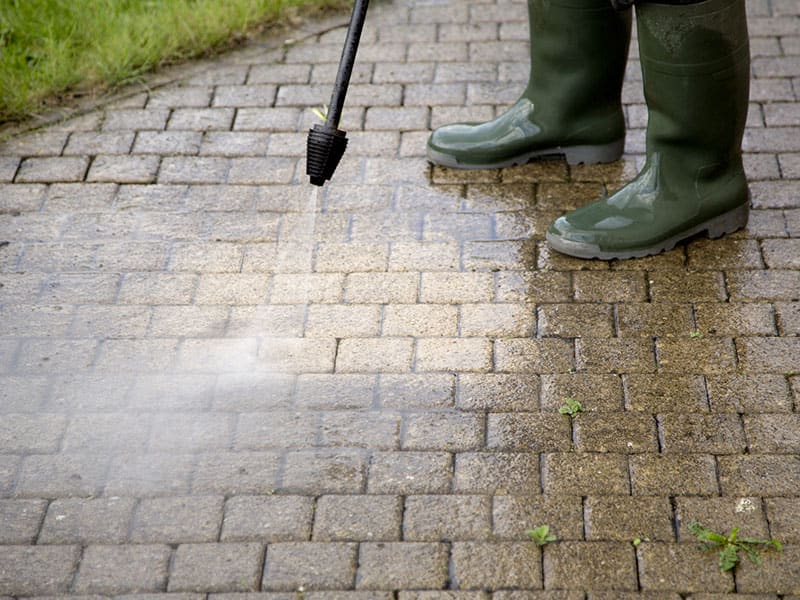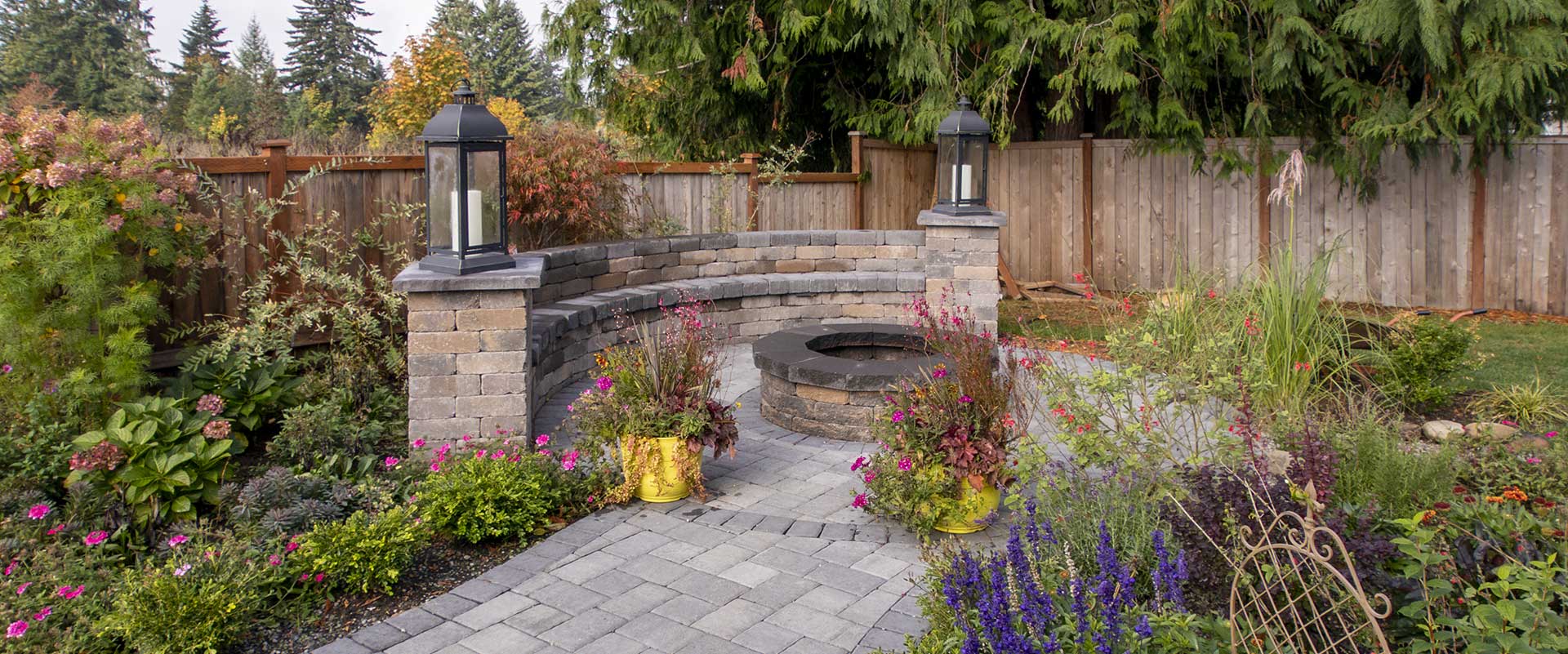Pavers are wonderful enhancements for backyards, driveways, and pool surrounds. Despite their natural visual appeal, knowing how to clean pavers is important for maintaining your property’s exterior aesthetics.
So, if you’re wondering how to clean concrete pavers, consult the guide below for everything you need to know. We’ll help you discover how to clean patio pavers without removing sand, how to clean pavers around a pool, and more.
The Importance of Cleaning Pavers
Pavers are incredibly durable, but that doesn’t mean they aren’t susceptible to dirt, grime, and wear. Not knowing how to clean stone pavers can negatively impact your home’s curb appeal.
Over time, constant weather and sunlight exposure can wash out pavers’ coloring. It also becomes easier for dirt and debris to settle on the pavers’ surface. By learning how to clean driveway pavers or those around your patio, walkways, or pool, you can brighten the material and make it look like new.

Tools Required for Cleaning Pavers
Before learning how to clean pavers, you must have the right tools at your disposal like:
- A bucket
- A hose
- A stiff-bristled broom or scrub brush
- Mild detergent
You might need equipment beyond the basics since you can clean stone or concrete pavers in several ways. If you choose to scrub your patio or driveway pavers by hand using a handheld scrub brush, you may want knee pads for comfort. You may need an anti-weed solution or weed trimmer to remove weeds before cleaning.
Different Cleaning Methods
Cleaning methods for pavers vary. You can use special equipment to breathe life into exterior surfaces or take a natural, homemade approach. Here are the top paver cleaning methods.
Power Washer
You can quickly blast away unwanted dirt and debris by using a power washer on your pavers. This option is best if you know how to adjust the water’s pressure to prevent damaging the paver surface.
Broom and Hose
If your driveway or patio paver only needs a gentle cleaning, you can wet it with a hose and scrub it with a brush. This method gently loosens dirt and debris that you can rinse away.
Mild Detergent and Water
Mix mild detergent like dish soap in a bucket with water to remove slightly tougher stains and debris. Then, use a brush or broom to scrub the pavers’ surface.
Vinegar and Water
A vinegar and water mixture is great for cleaning pavers as long as you use it correctly. Only use white vinegar to prevent staining. Be sure to combine it with enough water to reduce its acidity without eliminating its cleaning properties.
Baking Soda and Water
Using a mild abrasive like a baking soda and water paste effectively breaks down stubborn stains. Simply mix equal parts water and baking soda, create a paste, apply it to the pavers, and scrub it gently with a sponge.
Commercial Paver Cleaner
Commercial patio paver cleaners have a higher concentration than the solutions you can make at home. Still, the formulation is specific to pavers, so it won’t damage the material.
Paver Cleaning Process
Whether you use sand or gravel between your pavers, you don’t have to remove them from the material to clean the pavers. Learn how to clean pavers while retaining the sand between them using the guide below. You can refill gaps from deteriorating joint material afterward.
Clear the Space
The first step in cleaning pavers is to remove any items from the area that could be in the way. Carefully put patio furniture, potted plants, grills, and other items on the lawn to keep them safe and dry.
Tidy Any Vegetation
Sweep away leaves, twigs, and other loose debris from your pavers. If weeds are present, pull them out by hand. You can also use a weed trimmer or killer to eliminate them.
Get the Pavers Wet
Saturate the pavers with plain water from a garden hose. Wet the entire surface for optimal results.
Prepare a Mild, Non-Acidic Cleaning Solution
In your bucket, add warm water with dish soap. Vigorously mix the solution with a broom or brush to create suds. You can substitute a commercial-grade paver cleaner for the soap or make a vinegar and water solution.
Gently Scrub the Pavers
Saturate the broom or brush in the solution. Scrub the surface of the pavers gently in a circular motion.
Rinse the Pavers
Rinse the pavers after scrubbing thoroughly. Repeat the process until you’re satisfied with the results.
How NOT To Clean Pavers?
Due to the durable nature of stone and concrete pavers, you might think abrasive cleaning materials are best for cleaning them. However, using items like wire bristle scrubbing brushes can create unsightly scratches. The damage will also weaken the pavers’ protective seal, making them vulnerable to cracks.
A pressure washer is another cleaning tool that could cause problems for your pavers. The highly pressurized water could strip compacted dirt and tough stains from the pavers. Yet, it could also destroy the protective seal over concrete pavers if the water pressure is too high.
Frequently Asked Questions — Paver Cleaning
What Is the Best Way To Clean Pavers?
The best way to clean pavers around your home is to sweep them and hose them down monthly. If they still look dirty, you can scrub them gently with a mild cleaner.
Will Vinegar Damage Patio Pavers?
Undiluted vinegar will damage patio pavers because the liquid is highly acidic. Still, properly diluting white vinegar with water can effectively and naturally lift tough stains from concrete or brick pavers.
What Is the Best Chemical for Cleaning Outdoor Pavers?
The best chemical to use while cleaning outdoor pavers is a mild detergent with water. Dish soap is perfect for removing dirt, grime, and debris without damaging the paver, regardless of the material.
Conclusion
Now that you know how to clean pavers around your home, driveway, and pool, trust BL Landscaping & Construction to provide a quality paver installation. We’re a top-rated paver contractor serving the Pacific Northwest, delivering unmatched customer service and comprehensive paver services.We offer patio, driveway, and outdoor firepit installations, all with 15-year workmanship warranties. Call BL Landscaping & Construction at (360) 837-6170 today to request a free estimate.

